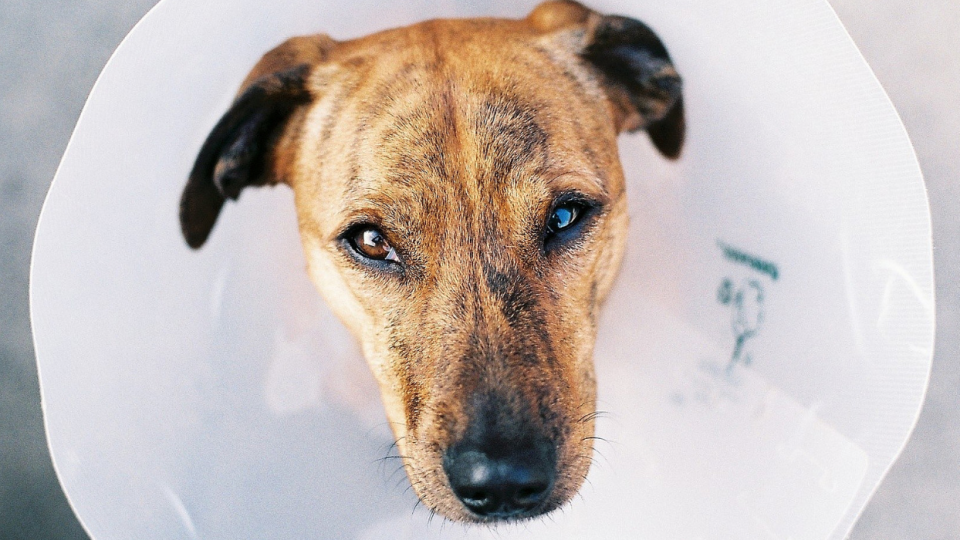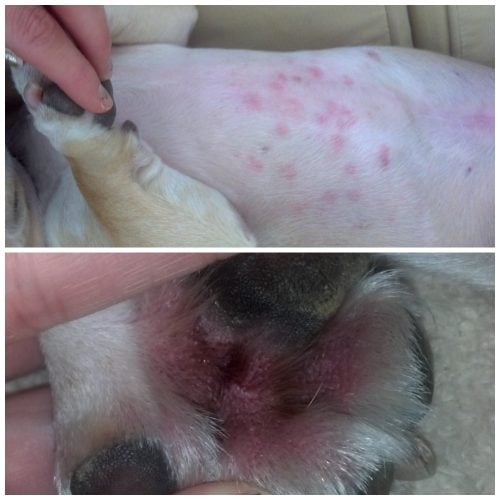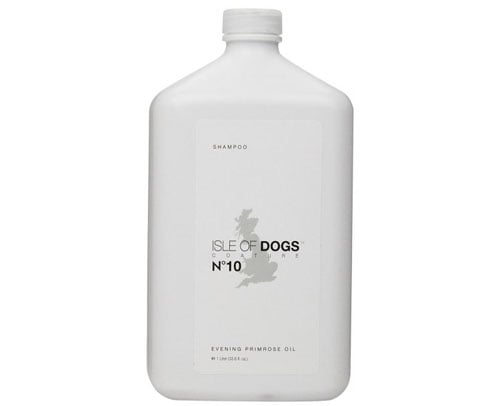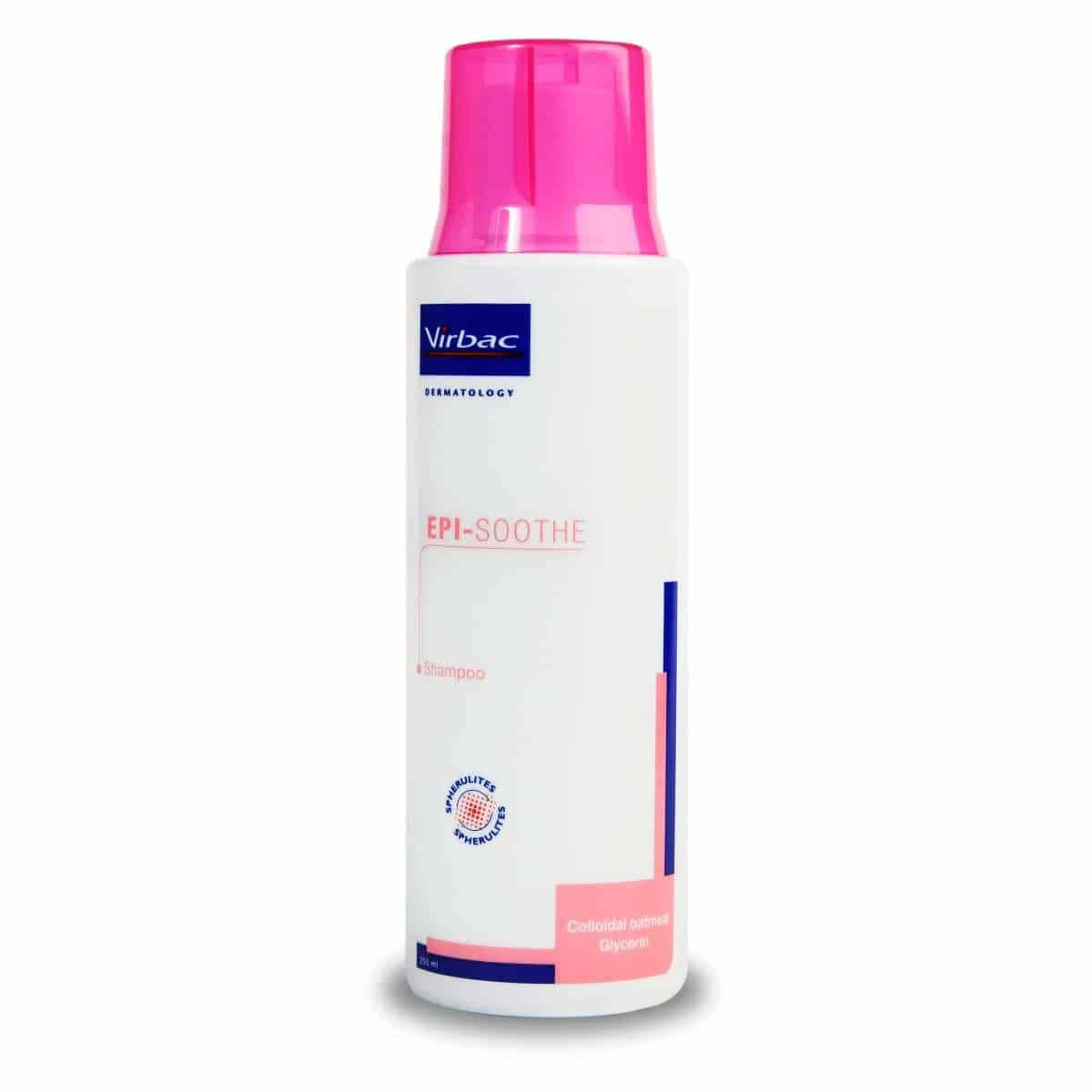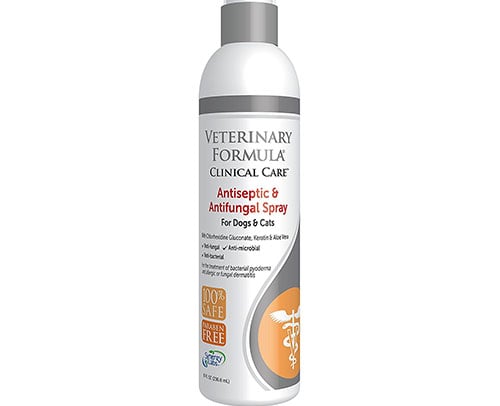Is your dog an obsessive licker? Does he frequently scratch or scoot across the floor? Just like humans, dogs can overreact to harmless allergens in the air, sneezing and itching as a result.
We consulted veterinary dermatologist Dr. Nicole Eckholm to find out how to spot, treat and stop dog allergies.
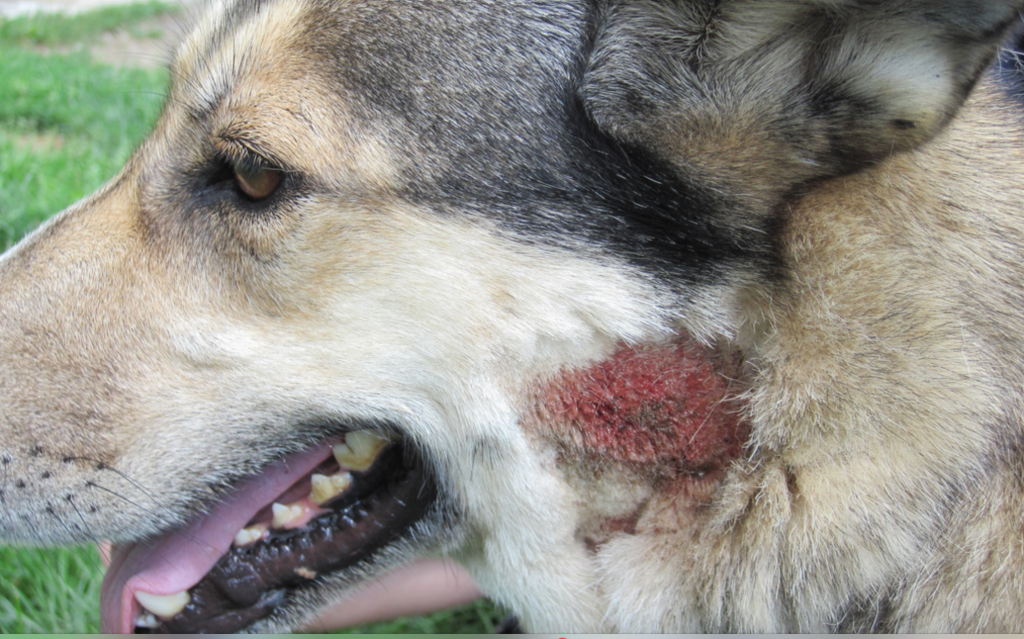
A mild antiseptic spray will help treat hot spots. Your vet can also provide prescription products.
Dogs with allergies will often lick and scratch until they get “hot spots” like this one, which can be cleaned gently with a mild antiseptic spray. But it’s still important for your vet to take a look. A vet who comes to your house can help you reduce your dog’s exposure to environmental irritants in your home if that’s a concern.
How to Spot Dog Allergies
There are four main types of dog allergies: atopy, flea, food and contact.
Atopy refers to environmental dog allergies; a dog’s body releases excess histamine when exposed to higher concentrations of pollen in the air, which prompts symptoms. This article focuses mainly on environmental allergies. If you’re concerned about food allergies, talk to your vet, and try a limited-ingredient diet to determine which ingredients your dog might be reacting to.
Environment-related itching will likely start seasonally, which initially is how you can distinguish between atopy and other types of dog allergies. The most common signs of atopic allergies are:
- Itching
- Scratching
- Biting
- Chewing
Home Treatment Options and Helpful Hints
You can help your allergic dog in a number of ways completely unrelated to medicine.
1.Wipe down your dog to remove allergens after walks
Pet grooming wipes are a quick way to remove dander and allergens when a full bath isn’t possible. We like the fragrance-free, hypoallergenic Pogi’s wipes.
2. Try a hypoallergenic shampoo
Look for anti-itch shampoos with soothing ingredients like aloe, oats, or evening primrose oil. That’s the main ingredient in this highly-rated choice.
3. Use supplements such as biotin or omega-3s
or omega-3s
These help to suppress itching and improve coat health. Vet’s Best also offers well-regarded natural supplements to combat seasonal allergies.
4. Give baths with a gentle or medicated shampoo
Baths help to control the amount of allergens on your dog’s skin, as long as you avoid any products that will irritate or dry out their skin.
5. Apply a medicated spray
This popular choice from SynergyLabs helps treat fungal and bacterial skin infections, plus contains soothing aloe.
6. Use prescription shampoos or sprays for dog allergies
Have a chat with your vet about what they have available on prescription to help your pup.
Getting Relief: Medical Treatment Options for Dog Allergies
Do you pop a Benadryl or Claritin when your allergies act up? The first way to get relief for your pet is the same—antihistamines!
You must consult your vet to determine which antihistamine is best and get specific dosage for your dog.
Unfortunately, antihistamines are only effective in 30% of dogs. While they may work at first, antihistamines often lose effectiveness against dog allergies.
“If an antihistamine is effective, you could carry that out as long as it lasts,” Dr. Eckholm explains. “Sometimes, you can manage allergies just with that. Other times, as allergies progress, antihistamines are no longer effective.”
The next option is a much stronger medication—corticosteroids. Steroids are much more effective at treating dog allergy symptoms but are not recommended for long-term use because of possible severe and permanent side effects. But don’t be hesitant to use steroids because of the stigma—they can be very effective even in small doses and can really help give relief to an itchy pet.
“It’s about quality of life,” Dr Eckholm reasons.
If you graduate to steroids, you should also pursue allergy testing at that time.
“Allergy testing and immunotherapy [allergy injections] are the gold standard for managing environmental allergies,” Dr. Eckholm says. “Allergy shots are the only effective method to stop the progression of allergies.”
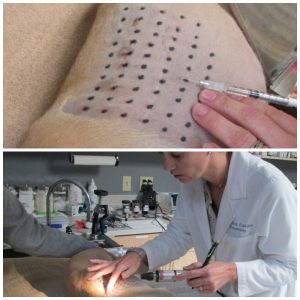
Intra-dermal or skin allergy testing is done by injecting allergens into the skin of a sedated dog and seeing which ones the dog reacts to. Dr Nicole Eckholm is seen at bottom reading the results of Yellow Dog.
Dogs are allergy tested much the same as humans; allergens are numbered and injected into the skin along with a positive and negative control. If the sedated dog has a reaction, a hive or welt appears within 15 minutes of the injection. The vet administering the test will look at each hive and determine the degree of redness, which determines which allergens are the most significant. All of the allergens are then mixed together in various concentrations to formulate the allergy shot.
The concentration of the allergens in the injections will increase slowly over time in order to desensitise your pet’s immune system. It takes six to nine months to start seeing the results against dog allergies. Immunotherapy has up to an 80% success rate and although a dog may not see 100% improvement, Dr Eckholm still thinks it’s worth it to try the injections.
“If the dog is greater than 50% improved, it’s worth continuing the allergy shots,” Dr Eckholm suggests.
If your dog’s allergies do not respond well enough to immunotherapy, the final option is immunosuppressants (or immune modulators), which suppress the immune system so that it will not respond to harmless allergens. The two prescription drugs on the market are Atopica and Apoquel, but both can cause side effects—mainly vomiting and diarrhoea but also an increased risk of infection from having a weakened immune system.
Dr Eckholm says the chosen treatment depends on each individual dog.
“Every dog is going to be affected differently,” Dr Ekholm says. “So it just depends on response to treatment.”
The Benefits of Immunotherapy for Dog Allergies
It’s important you seek immunotherapy treatment as soon as possible for your allergic pet for a number of reasons.
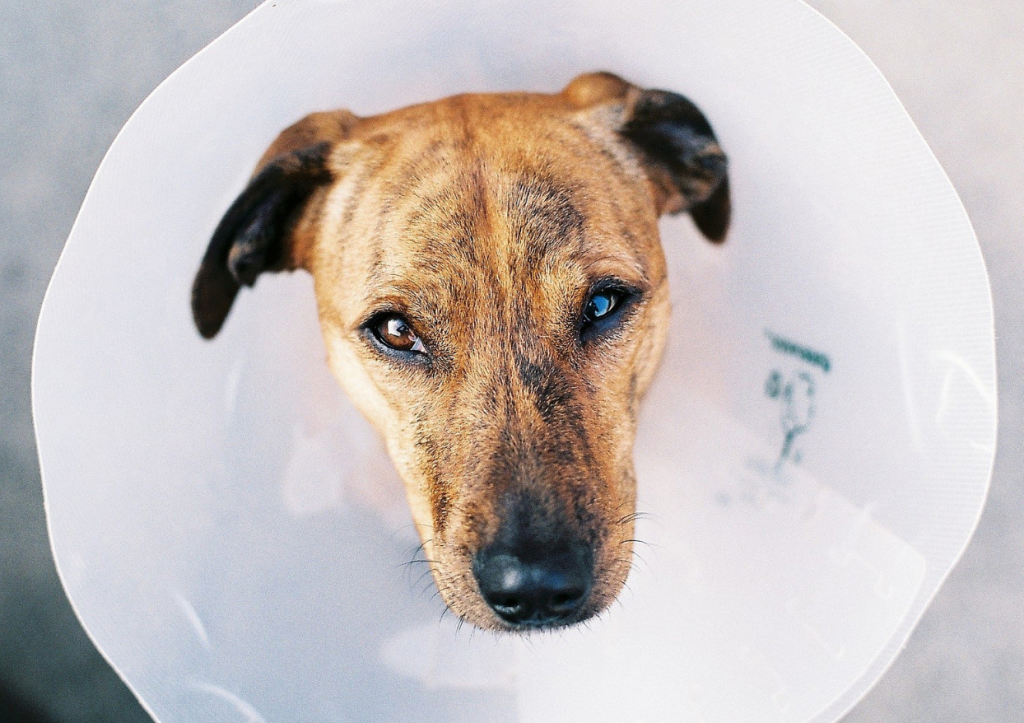
Getting your dog some relief from their allergy itches can lead to a much better quality of life. Otherwise, they might have to live their life in the cone, which is no way to live at all!
First, as previously mentioned, environmental allergies are progressive and will worsen as a dog gets older. Immunotherapy is much more successful in younger pets.
“The younger you allergy test a dog and start immunotherapy, the better they do,” Dr Eckholm explains. “If a dog comes in as a senior, I don’t often recommend testing them because it’s not as effective.”
It’s also about quality of life for your pet. Just what does quality of life mean? Anyone with an allergic dog can tell you, relief from constant itching and scratching without having to keep your dog in a cone 24/7 is worth it! If you don’t cone your dog, you risk them developing painful hot spots from incessant licking. Who wants their dog to live like that?
Also, dogs will develop secondary bacterial infections as a result of their allergies. These are managed with antibiotics, which also become less effective over time.
“Secondary bacterial infections can become resistant with the repeated use of antibiotics, making it more difficult (and expensive) to treat these infections when they arise,” Dr Eckholm says.
The Testing Process for Dog Allergies and Giving Injections
The intra-dermal testing process is actually quite easy—and not traumatic!—for you and your dog. The vet dermatologist will need to shave a 10 by 15cm patch of hair on your dog to inject the allergens.
Your area vet dermatologist will inject the most common allergens in general, and the ones specific to the region where you live. Overall, they will test roughly 50 different items to get the best idea what your dog is reacting to.

Dog allergy injections are formulated by mixing all the allergens they reacted to in a vial to give in varying doses as an injection.
Your dog will react within minutes with varying degrees of redness, or no reaction at all. Your dog’s allergy injection will be formulated based on the severity and number of reactions.
Depending on the severity of allergies, you will be required to give them an allergy injection every other day for 30 days followed by once a week for a year. Maintenance will depend on your dog’s response.
For example, after a year of consistent jabs, my dog only needs a shot every three to four weeks or so, which is very cost-effective to maintain.
If you are skittish about physically giving your dog an allergy shot, there is another option. The alternative is sublingual immunotherapy under the tongue—SLIT for short—which is a pump you squeeze into their mouth. “About a third of people choose that route either because they’re afraid their dog will bite or they don’t want to do injections,” Dr Eckholm says.
Which Dogs are at Risk?
About ten percent of all dogs develop environmental allergies. Some breeds are more susceptible, such as:
- Retrievers
- Terriers
- Boxers
- Dalmatians
- Bulldogs
- Shepherds
- Beagles
- Irish Setters
You cannot simply avoid the allergens especially trees, grasses, and dust mites. “They’re allergic to the pollen and that is carried in the air,” Dr Eckholm explains. “It can be carried up to 30 miles in the air, and dust mites are everywhere.”
Remember: if your dog does develop allergies, he should not be bred.
The Bottom Line
Environmental allergies are on the rise. From trees and grasses to dust mites, even to cats and cockroaches, there are a number of things your dog may be allergic to, which can cause him to be pretty miserable and at risk of developing infections without treatment. It’s worth it to see a dermatologist to try to give your pal a chance at a more comfortable life.
If you’re concerned about human allergies to dog hair, wise up with our list of low-shedding dogs breeds.
Along with lots of articles with tips on how to care for your dog, Rover.com also has plenty of fantastic dog walkers and sitters who offer dog boarding in your area.
